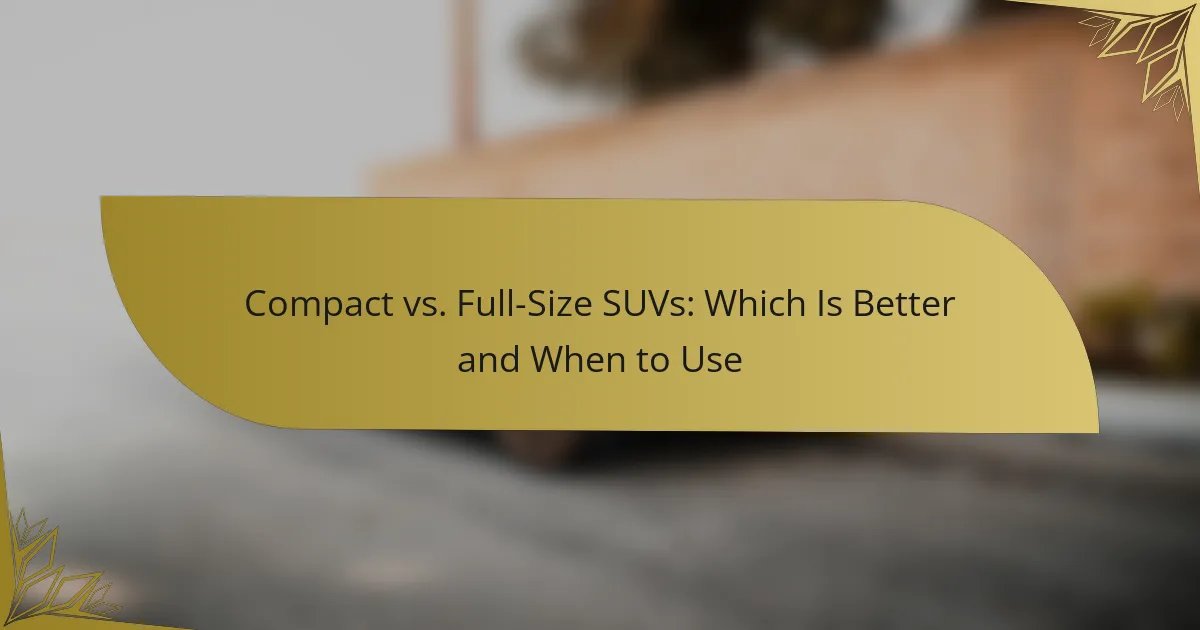When deciding between compact and full-size SUVs, it’s essential to consider your specific needs and driving environment. Compact SUVs excel in urban settings, offering maneuverability and fuel efficiency, while full-size SUVs provide spacious interiors and robust capabilities for families and outdoor activities. Understanding these differences can help you choose the right vehicle for your lifestyle.

What are the advantages of compact SUVs in urban areas?
Compact SUVs offer several advantages in urban settings, primarily due to their size and efficiency. They are easier to navigate through crowded streets and can fit into tighter parking spaces, making them ideal for city driving.
Better maneuverability
Compact SUVs are designed to be smaller and lighter than their full-size counterparts, which enhances their maneuverability. This makes it easier to make sharp turns, navigate narrow streets, and handle heavy traffic. For instance, a compact SUV can often turn in a smaller radius, allowing for more agile driving in urban environments.
When driving in cities, the ability to quickly change lanes or make U-turns can significantly reduce travel time. This is particularly beneficial during rush hours when traffic congestion is common.
Improved fuel efficiency
Compact SUVs generally consume less fuel compared to full-size SUVs, making them a more economical choice for city dwellers. Many models achieve fuel efficiency ratings in the range of 25 to 30 miles per gallon (mpg), which can lead to significant savings on fuel costs over time.
Additionally, lower fuel consumption contributes to reduced emissions, aligning with urban sustainability goals. This can be a deciding factor for environmentally conscious drivers looking to minimize their carbon footprint.
Lower cost
The purchase price of compact SUVs is typically lower than that of full-size models, making them more accessible for many buyers. Prices can vary widely, but compact SUVs often start in the low $20,000 range, while full-size SUVs may begin in the mid-$30,000s or higher.
Beyond the initial cost, compact SUVs usually incur lower insurance premiums and maintenance expenses, further enhancing their affordability. This makes them a practical choice for budget-conscious consumers living in urban areas.

What are the benefits of full-size SUVs for families?
Full-size SUVs offer significant advantages for families, primarily through their spacious interiors, robust towing capabilities, and enhanced safety features. These vehicles are designed to accommodate larger groups comfortably while providing the necessary power for family activities.
Increased passenger space
Full-size SUVs typically provide ample passenger space, often seating seven to eight individuals comfortably. This extra room is particularly beneficial for families with multiple children or those who frequently travel with friends and relatives.
In addition to seating, full-size SUVs often have generous cargo areas, allowing families to transport strollers, sports equipment, and luggage without sacrificing comfort. The flexible seating arrangements, such as foldable rear seats, further enhance their utility.
Higher towing capacity
Full-size SUVs generally have a higher towing capacity compared to compact models, often ranging from 6,000 to 10,000 pounds. This makes them ideal for families who enjoy outdoor activities, such as camping or boating, where towing trailers or boats is necessary.
When selecting a full-size SUV for towing, consider the vehicle’s engine size and drivetrain, as these factors significantly influence towing performance. Always check the manufacturer’s specifications to ensure the SUV meets your towing needs.
Advanced safety features
Many full-size SUVs come equipped with advanced safety features, which are crucial for family vehicles. Common features include adaptive cruise control, lane-keeping assist, and automatic emergency braking, which help prevent accidents and enhance overall safety.
Additionally, full-size SUVs often perform well in crash tests, providing peace of mind for families. When choosing a vehicle, look for models that have received high safety ratings from organizations like the National Highway Traffic Safety Administration (NHTSA) or the Insurance Institute for Highway Safety (IIHS).

When should you choose a compact SUV over a full-size SUV?
Choosing a compact SUV is ideal when you prioritize maneuverability, fuel efficiency, and urban driving. These vehicles are generally easier to park and navigate through city streets compared to their larger counterparts.
City driving scenarios
In urban environments, compact SUVs excel due to their smaller size, which allows for easier parking and better handling in tight spaces. They typically have a tighter turning radius, making them more suitable for navigating congested streets and crowded areas.
Additionally, compact SUVs often offer better fuel efficiency, which can be a significant advantage for city dwellers facing frequent stop-and-go traffic. This can lead to savings on fuel costs over time, making them a practical choice for daily commuting.
Budget constraints
If you’re working within a tight budget, compact SUVs generally come with lower purchase prices and reduced insurance costs compared to full-size models. They also tend to have better fuel economy, which can result in lower ongoing expenses.
Consider the total cost of ownership, including maintenance and fuel, when evaluating your options. Compact SUVs often require less expensive repairs and parts, making them a more economical choice in the long run.
Occasional use
For those who need a vehicle primarily for occasional use, a compact SUV is often sufficient. They provide ample space for passengers and cargo without the bulk of a full-size SUV, making them a versatile option for weekend trips or errands.
If your driving needs are limited to short distances or infrequent outings, a compact SUV can offer the necessary functionality without the commitment of a larger vehicle. This makes them an excellent choice for individuals or small families who do not require a full-size SUV’s capacity on a daily basis.

When is a full-size SUV the better option?
A full-size SUV is often the better choice when you need more space, power, and capability. These vehicles excel in situations that require extensive passenger capacity, heavy towing, or significant cargo space.
Long road trips
For long road trips, a full-size SUV provides ample room for passengers and luggage, making it a comfortable option for families or groups. With seating for up to eight people and generous cargo capacity, these vehicles can accommodate everything from suitcases to sports equipment.
Additionally, full-size SUVs often come equipped with advanced entertainment systems and features that enhance the travel experience, such as rear-seat screens and multiple charging ports. This can make long journeys more enjoyable for everyone on board.
Heavy cargo needs
If you frequently transport heavy or bulky items, a full-size SUV is typically the better choice due to its higher towing capacity and larger cargo area. Many models can tow several thousand pounds, making them suitable for trailers, boats, or heavy equipment.
When selecting a full-size SUV for cargo needs, consider the vehicle’s payload capacity and towing specifications. This ensures that you choose a model that can handle your specific requirements without compromising safety or performance.
Growing families
Growing families benefit from the spacious interiors and safety features of full-size SUVs. These vehicles often include multiple seating configurations and advanced safety technologies, such as lane-keeping assist and adaptive cruise control, which are crucial for family travel.
Moreover, the extra space allows for easy installation of child safety seats and provides room for additional passengers or gear. This flexibility makes full-size SUVs a practical choice for families that need to adapt to changing needs over time.

What are the key differences between compact and full-size SUVs?
Compact SUVs are generally smaller and more fuel-efficient than full-size SUVs, which offer more space and power. Choosing between them depends on your needs for passenger capacity, cargo space, and driving preferences.
Size and dimensions
Compact SUVs typically range from about 4.2 to 4.5 meters in length, making them easier to maneuver in urban settings. In contrast, full-size SUVs can exceed 4.8 meters, providing more interior space for passengers and cargo.
For families or those needing extra room, full-size SUVs often feature three rows of seating, accommodating up to eight passengers. Compact SUVs usually have two rows and can seat five comfortably, making them suitable for smaller families or individuals.
Performance and handling
Compact SUVs often have smaller engines, which can lead to better fuel efficiency and easier handling, especially in city driving. They typically offer a more car-like driving experience, which can be appealing for daily commutes.
Full-size SUVs, on the other hand, are designed for power and towing capacity, making them ideal for off-road adventures or transporting heavy loads. However, their larger size can make them less agile in tight spaces.
Price range
The price of compact SUVs usually starts in the low $20,000s and can go up to around $35,000 for higher trims. This makes them a more budget-friendly option for many buyers.
Full-size SUVs generally have a higher starting price, often beginning in the mid $30,000s and reaching well into the $70,000s for luxury models. When considering your budget, factor in not only the purchase price but also potential fuel costs and insurance rates, which can be higher for larger vehicles.

How do compact and full-size SUVs compare in terms of safety ratings?
Compact and full-size SUVs often differ in safety ratings due to their size, weight, and design features. Generally, full-size SUVs tend to score better in crash tests due to their larger mass, which can provide more protection in collisions.
Crash Test Ratings
Crash test ratings from organizations like the National Highway Traffic Safety Administration (NHTSA) and the Insurance Institute for Highway Safety (IIHS) are crucial for evaluating safety. Full-size SUVs often receive higher ratings in categories such as frontal crash and side impact tests, owing to their robust structure. Compact SUVs may still perform well but typically have lower ratings due to their smaller size.
Safety Features
Both compact and full-size SUVs are increasingly equipped with advanced safety features, such as automatic emergency braking, lane departure warnings, and adaptive cruise control. Full-size models may offer more advanced technology options as standard, while compact SUVs might require additional packages to include similar features. When choosing, consider which safety features are essential for your needs.
Real-World Performance
In real-world scenarios, the safety of an SUV can also depend on factors like driving conditions and driver behavior. Full-size SUVs may provide a sense of security on highways due to their size, while compact SUVs can be easier to maneuver in urban settings. It’s important to assess how you plan to use the vehicle and choose one that aligns with your driving habits and environment.



